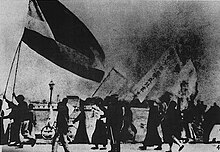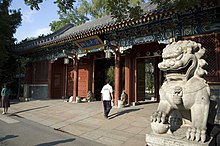Peking University
[5] Following China's defeat in the Sino-Japanese War, intellectuals – including Kang Youwei, Liang Qichao, and Yan Fu – called for reforms to the country's education system.On 11 June 1898, the Guangxu Emperor, as part of the Hundred Days' Reform, authorised the creation of the Imperial University of Peking[6] (Chinese: 京師大學堂; pinyin: Jīngshī Dàxuétáng; lit.The noted scholar Cai Yuanpei was appointed president on 4 January 1917, and helped transform Peking University into the country's largest institution of higher learning, with 14 departments and an enrollment of more than 2,000 students.[citation needed] President Cai, inspired by the German model of academic freedom, introduced faculty governance and democratic management to the university.[citation needed] Cai recruited an intellectually diverse faculty that included some of the most prominent figures in the progressive New Culture Movement, including Hu Shih, Liu Bannong, Ma Yinchu, Li Dazhao, Chen Duxiu, Lu Xun and Liang Shuming.[8][failed verification] A firm supporter for freedom of thought, Cai advocated for educational independence and resigned several times protesting the government's policy and interference.[9][failed verification] On 1 May 1919, some students of Peking University learned that the Treaty of Versailles would allow Japan to receive Germany's colonising rights in Shandong province.The Beiyang government eventually agreed to release the arrested students and fired the three officials under intense public pressure, China's representatives in Paris refused to sign the Treaty of Versailles."[11][failed verification] In October 2015, Peking University alumni Professor Tu Youyou was awarded the Nobel Prize in Physiology or Medicine for her discovery of artemisinin.Having saved millions of lives, artemisinin has made significant contributions to global health in regard to the fight against malaria.[18] The first dean of Lanyuan Centre is Ke Yang, Professor of Peking University School of Clinical Oncology and a foreign academician of the American Academy of Medical Sciences.[24][25] Notable items in these museums include funerary objects that were excavated in Beijing and date back thousands of years from the graves of royals of the Warring States period.[25] Beyond its main campus, Peking University Health Science Center (PKUHSC) is on Xueyuan Road where the country's most distinguished colleges are, and is a fitting site for academics and research.Dr. Wen Hai, a renowned economist in China and the vice-president of Peking University is the present chancellor of PKU Shenzhen.The comprehensive collaboration of offering dual degrees at all bachelor's, master's, and doctoral levels, as seen in the Peking-Waseda partnership, is rare on a global scale.[82][83][84][85] The dormitories for international students at the main campus are located at Shaoyuan Garden (勺园) and Zhongguanyuan Global Village (中关新园).[100][101] Notable alumni in the sciences include Nobel laureate Tu Youyou, who for her work in discovering artemisinin and dihydroartemisinin used to treat malaria, was awarded the Nobel Prize in Physiology or Medicine jointly with William C. Campbell and Satoshi Ōmura;[102] nuclear physicists and contributors to Chinese nuclear weapons program Qian Sanqiang and Deng Jiaxian, and "father of the Chinese hydrogen bomb" physicist Yu Min, nuclear physicist Zhu Guangya, particle physicist and discoverer of the partial conservation of the axial current, Zhou Guangzhao; mathematician and MacArthur Fellow Yitang Zhang,[103] neurosurgeon Wang Zhongcheng, pulmonologist and recipient of the Medal of the Republic, Zhong Nanshan,[104] and chief economist of the World Bank, Justin Yifu Lin.[105] Notable alumni in the humanities and arts include author Lu Xun, philosopher and essayist Hu Shih,[106] polymath Lin Yutang, philosopher Liang Shuming, Qing-dynasty educator Gu Hongming, anthropologist Fei Xiaotong, translator Li Bulou, computer scientist Wang Xuan, and author Jin Yong.[110] Notable alumni in business include co-founder and CEO of Baidu, billionaire Robin Li,[111] and cryptocurrency entrepreneur Justin Sun.









PublicPresidentGong QihuangParty SecretaryHao PingUndergraduatesPostgraduatesHaidianColoursBESETOHASimplified ChineseTraditional ChineseStandard MandarinHanyu PinyinBopomofoWade–GilesTongyong PinyinYue: CantoneseYale RomanizationJyutpingChineseBeijingMinistry of Education of ChinaProject 211Project 985Double First-Class ConstructionC9 LeagueGuangxu EmperorTianjin Universitygovernment of the Republic of ChinaYenching UniversityBeijing Medical UniversityChinese Academy of SciencesChinese Academy of EngineeringWorld Academy of SciencesSino-Japanese WarKang YouweiLiang QichaoYan FuHundred Days' Reformpinyinroyal charterSun JianaiWilliam Alexander Parsons MartinEmpress Dowager CixiXinhai Revolutionsimplified Chinesetraditional ChineseCai YuanpeiNew Culture MovementHu ShihLiu BannongMa YinchuLi DazhaoChen DuxiuLu XunLiang ShumingGu HongmingHuang KangovernmentTreaty of VersaillesMay Fourth MovementTiananmenBeiyang governmentCao RulinMinistry of TransportationCriticize Lin, Criticize ConfuciusTsinghua UniversityhomophoneTu YouyouNobel Prize in Physiology or MedicineartemisininmalariaBritish Open UniversityMoscow State UniversitySt. Petersburg UniversityChangpingLancetaging in ChinaInternational University Sports FederationTalbot HamlinArthur M. SacklerWarring States periodPeking University Health Science CenterThird FrontHanzhongShenzhenShenzhen Graduate SchoolMain Libraryhuabiaobachelor's degreedoctoral candidatesbasic researchapplied researchGeorgia Institute of TechnologyEmory UniversityWallace H. Coulter Department of Biomedical EngineeringTsinghuaRenmin UniversityZhejiang UniversityFudan UniversityNankai UniversityChinese University of Science and TechnologyUniversity rankingsmainland ChinaChinese universitiesTHE-QS World University RankingsU.S. News & World ReportTimes Higher Education BRICS & Emerging EconomiesQS RankingsTimes Higher Education World University RankingsThe Three University Missions RankingAcademic Ranking of World UniversitiesTimes Higher Education World Reputation RankingsCWTS Leiden RankingNature IndexNature ResearchSCImago Institutions RankingsClarivate AnalyticsHighly Cited ResearchersLaw SchoolGuanghua School of ManagementPeking University Third HospitalYuanpei CollegeYenching AcademyHSBC Business School